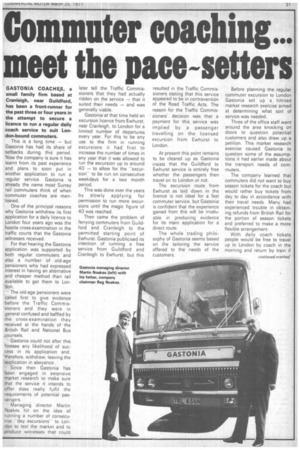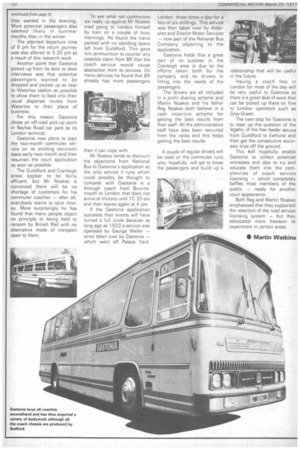Commuter coaching... meet the pace setters
Page 33

Page 34

If you've noticed an error in this article please click here to report it so we can fix it.
GASTONIA COACHES, a small family firm based at Cranleigh, near Guildford, has been a front-runner for the past three or four years in the attempt to secure a licence to run a regular daily coach service to suit London-bound commuters.
This is a long time -but Gastonia has had its share of setbacks during this period. Now the company is sure it has learnt from its past experience and plans to soon put in another application to run a regular service. Gastonia is already the name most Surrey rail commuters think of when commuter coaches are mentioned.
One of the principal reasons why Gastonia withdrew its first application for a daily licence to London four years ago was the hostile cross-examination in the traffic courts that the Gastonia witnesses received.
For that hearing the Gastonia application was supported by both regular commuters and also a number of old-age pensioners who had expressed interest in having an alternative and cheaper method than rail available to get them to London.
The old-age pensioners were called first to give evidence before the Traffic Commissioners and they were in general confused and baffled by the cross-examination they received at the hands of the British Rail and National Bus counsels.
Gastonia could not after this foresee any likelihood of success in its application and, therefore, withdrew, leaving the application in abeyance.
Since then Gastonia has been engaged in extensive market research to make sure that the service it intends to offer does really fulfil the requirements of potential passengers.
Managing director Martin Noakes hit on the idea of running a number of consecutive -day excursions'' to London to test the market and to produce witnesses that could
later tell the Traffic Commissioners that they had actually ridden on the service that it suited their needs — and was generally viable.
Gastonia at that time held an excursion licence from Ewhurst, near Cranleigh, to London for a limited number of departures every year. For this to be any use to the firm in running excursions it had first to increase the number of times in any year that it was allowed to run the excursion up to around 40 -to allow for the -excursionto be run on consecutive weekdays for a two month period.
This was done over the years by slowly applying for permission to run more excursions until the magic figure of 40 was reached.
Then came the problem of ferrying commuters from Guildford and Cranleigh to the permitted starting point of Ewhurst, Gastonia publicised its intention of running a free service from Guildford and Cranleigh to Ewhurst, but this resulted in the Traffic Commissioners stating that this service appeared to be in contravention of the Road Traffic Acts. The reason for the Traffic Commissioners' decision was that a payment for this service was implied by a passenger travelling on the licensed excursion from Ewhurst to London.
At present this point remains to be cleared up as Gastonia insists that the Guildford to Ewhurst service is entirely free whether the passengers then travel on to London or not.
The excursion route from Ewhurst as laid down in the licence is not ideal for a fast commuter service, but Gastonia is confident that the experience gained from this will be invaluable in producing evidence for its main application for a direct route.
The whole trading philosophy of Gastonia seems based on the tailoring the service offered to the needs of the customers. Before planning the regular commuter excursion to London Gastonia set up a limited market research exercise aimed at determining what sort of service was needed.
Three of the office staff went around the area knocking on doors to question potential customers and also draw up a petition. This market research exercise caused Gastonia to question some of the assumptions it had earlier made about the transport needs of commuters.
The company learned that commuters did not want to buy season tickets for the coach but would rather buy tickets from day to day in accordance with their travel needs. Many had experienced trouble in obtaining refunds from British Rail for the portion of season tickets and preferred to make a more flexible arrangement.
With daily coach tickets people would be free to travel up to London by coach in the morning and return by train if they wanted in the evening. More potential passengers also seemed likely in summer months than in the winter.
The planned departure time of 6 pro for the return journey was also altered to 5.30 pm as a result of this research work.
Another poirrt that Gastonia picked up from its door to door interviews was that potential passengers wanted to be dropped and picked up as near to Waterloo station as possible to allow them to feed into their usual dispersal routes from Waterloo to their place of business.
For this reason Gastonia chose an off-road pick-up point in Bayliss Road car park as its London terminal.
Gastonia now plans to start the two-month commuter service on its existing excursion basis early next month and then resurrect the court application as soon as possible.
The Guildford and Cranleigh areas appear to be fairly affluent, but Mr Noakes is convinced there will be no shortage of customers for his commuter coaches — after all, everybody wants to save money. More surprisingly he has found that many people object on principle to being held to ransom by British Rail with no alternative mode of transport open to them. To see what rail commuters are really up against Mr Noakes tried going to London himself by train on a couple of busy mornings. He found the trains packed with no standing space left from Guildford. This gave him ammunition to counter any possible claim from BR that the .coach service would cause abstraction from its services. On many services he found that BR already has more passengers than it can cope with.
Mr Noakes tends to discount the objections from National Bus to Gastonia's application as the only service it runs which could possibly be thought to compete with Gastonia is a through coach from Bournemouth to London that does not arrive at Victoria until 10.30 am and then leaves again at 4 pm.
If the Gastonia application succeeds then events will have turned a full circle because as long ago as 1933 a service was operated by George Weller — since taken over by Gastonia — which went off Palace Yard, London, three times a day for a fare of six shillings. This service was then taken over by Aldershot and District Motor Services -now part of the National Bus Company objecting to the application.
Gastonia holds that a great part of its success in the Cranleigh area is due to the efforts taken both by the company and its drivers in fitting into the needs of the passengers.
The drivers are all included in a profit sharing scheme and Martin Noakes and his father Reg Noakes both believe in a cash incentive scheme for getting the best results from their staff. All the administrative staff have also been recruited from the ranks and this helps getting the best results.
A couple of regular drivers will be used on the commuter runs who, hopefully, will get to know the passengers and build up 'a relationship that will be useful in the future.
Having a coach free in London for most of the day will be very useful to Gastonia as there is a great deal of work that can be picked up there on hire to London operators such as Grey-Green.
The next step for Gastonia is to clear up the question of the legality of the free feeder service from Guildford to Ewhurst and then get the consecutive excursion trips off the ground.
This will hopefully enable Gastonia to collect potential witnesses and also to try and educate them into • the complexities of coach service licensing -which completely baffles most members of the public 7 ready for another court appearance, Both Reg and Martin Noakes emphasised that they supported the retention of the road service licensing system — but they advocated more freedom to experiment in certain areas.
• Martin Watkins




























































































